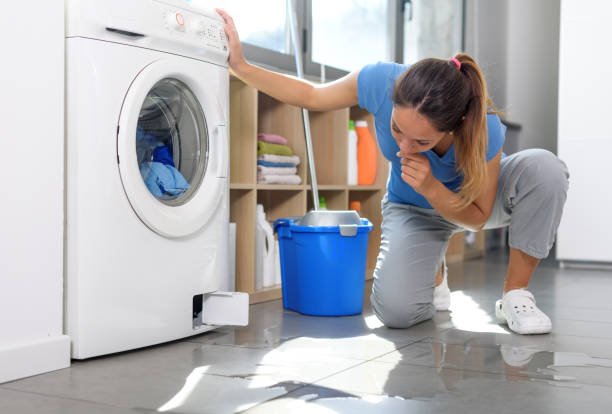Discovering that your washing machine is leaking from the bottom can be a worrying and frustrating experience. This issue not only disrupts your daily routine but can also lead to significant water damage if not addressed promptly. This article will explore how to handle a washing machine leaking from bottom, ensuring you can tackle the problem effectively and minimize any potential damage.
Turn Off the Power and Water Supply
The first step in addressing a washing machine leaking is to ensure your safety and prevent further damage. Immediately turn off the power to the washing machine at your circuit breaker. It’s crucial to avoid handling electrical appliances in wet conditions to prevent hanging. Next, turn off the water supply to stop the flow of water into the machine. These actions will help you manage the situation safely and start investigating the source of the leak.
Check for Obvious Sources of the Leak
Once you have safely turned off the power and water supply, inspect your washing machine leaking from bottom to locate the source of the leak. You can start by checking the most usual issues such as:
- Hoses and Connections: Ensure that the fill hoses are safely attached and that there are no cracks or damages. Sometimes, leaks can come from worn-out rubber washers or loose connections.
- Pump: The pump, which helps circulate and drain water, can also be a culprit. Look for any signs of leakage around the pump area, which is usually located at the bottom of the machine.
- Door Seal (for front loaders): If you have a front-loading washing machine, check the door seal for any tears or water accumulation, which might indicate a leak.
Clean and Clear the Drainage System
A blocked drainage system can cause water to back up and the washing machine leaking from bottom. To clear any blockages:
- Remove and clean the filter: Most washing machines have a drain filter to catch lint and small objects. Locate the filter, usually at the front lower part of your machine, remove it, and clean out any debris.
- Drain hose inspection: Ensure the drain hose is not kinked or blocked. Remove any obstructions you find within the hose to ensure smooth water flow.
Inspect for Internal Issues
If the external checks don’t reveal any problems, the washing machine leaking water might be due to internal issues. This might require a more detailed inspection:
- Water Inlet Valve: Check for any signs of crack or damage on the water inlet valve, which can cause leakage.
- Tub Seal: Over time, the tub seal can wear out and cause water to leak from the bottom of the machine. Inspecting and replacing a faulty tub seal may require professional help.
Test Your Machine
After making any adjustments or repairs, reconnect the water supply and power to test your washing machine. Run a short wash cycle while closely observing the machine to see if the leak persists. This will help you verify that you have resolved the issue or if further action is needed.
Time to Call a Professional
If you have tried all the above steps and the washing machine is still leaking from the bottom, it may be time to call a professional. Some issues, like internal component failures, are complicated and require unique knowledge and tools to fix.
Is Your Washing Machine Leaking and Disrupting Your Daily Routine?
Don’t let a leaky washing machine throw a wrench into your busy schedule. Our Washer Repair Services are here to diagnose and fix any issue with clarity and speed. Whether it’s a faulty hose, a damaged pump, or a worn-out seal, our expert technicians are equipped to handle all types of repairs. We ensure your appliance works efficiently without any more messy surprises. Say goodbye to leaks and hello to a smoothly-running household.
Ready to get your washing machine back in top shape without any hassle?
Conclusion
A washing machine leaking from bottom can be a nuisance, but by following these steps, you can either resolve the issue yourself or determine if professional assistance is needed. Regular maintenance and prompt attention to leaks not only extend the life of your washing machine but also help avoid the inconvenience and cost of significant water damage. Remember, when dealing with electrical appliances and water, safety should always come first.

